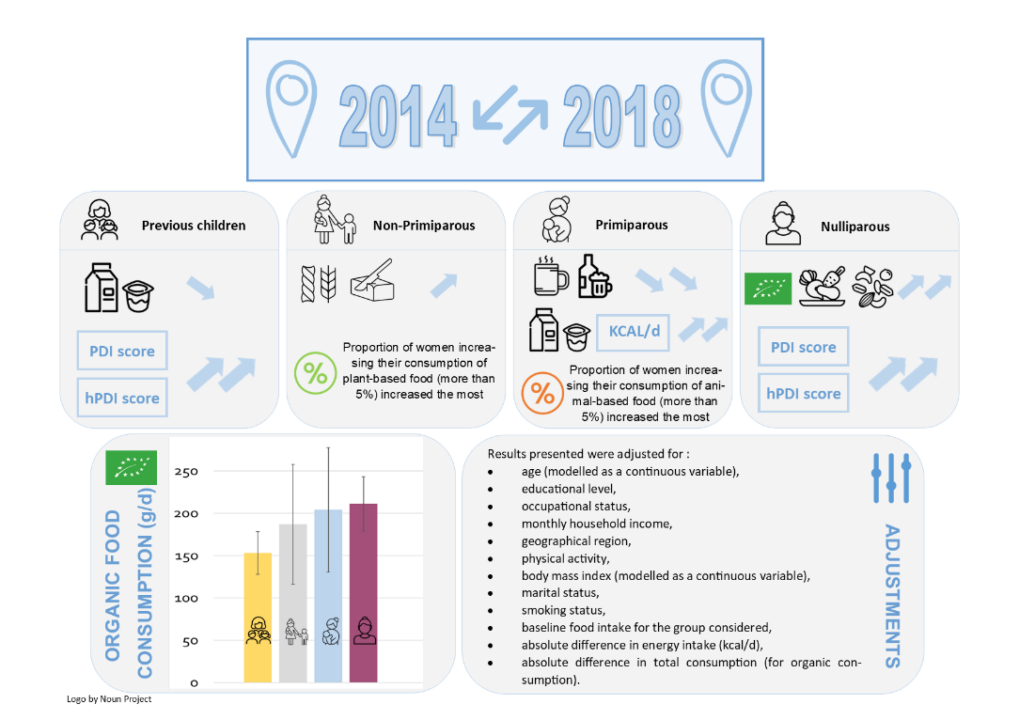
What are the changes in mothers’ diets after the birth of a child: results from the NutriNet-Santé cohort
Childbirth represents a profound life-changing event, and this transition period serves as an opportunity for individuals to enhance their eating habits. The objective of this longitudinal study was to identify and characterize the dietary changes in women based on their parity status—whether they had given birth previously or not.
The study utilized dietary intake data from 4,194 women of childbearing age who were part of the NutriNet-Santé cohort. Data collection involved a Food Frequency Questionnaire (FFQ) that was administered twice, once in 2014 and again in 2018. This methodology allowed researchers to accurately assess dietary behavior over time while distinguishing between the consumption of organic versus conventional foods. Based on their previous childbirth experiences, women were categorized into four distinct groups: ‘nulliparous’ (those who have never given birth), ‘primiparous’ (women who are experiencing childbirth for the first time), ‘multiparous’ (women who have had more than one child), and ‘previous children’ (those who have had children but might not currently have any).
To evaluate dietary changes within these groups, multi-adjusted ANCOVA models were employed. The study uncovered that all four groups exhibited a trend toward a healthier, plant-based, and organic diet, although the extent of this shift varied significantly among them. Notably, ‘nulliparous’ women displayed the most pronounced improvement in sustainable food consumption compared to their counterparts in the ‘previous children’ group.
For the ‘primiparous’ women, the study revealed significant dietary shifts, including an average increase in daily energy intake of 349 calories, along with a noticeable rise in dairy product consumption by 30 grams each day. Furthermore, this group demonstrated a significant reduction in their intake of alcohol, averaging a decrease of 23 grams per day, as well as a substantial cutback on caffeine sources, which included coffee and tea, with a decrease of 107 grams per day.
When examining the consumption of organic foods, it was found that ‘nulliparous’ women reported a greater increase in their organic food consumption compared to the ‘previous children’ and ‘primiparous’ groups. Interestingly, the ‘primiparous’ women often ranked in the highest quintile for organic food intake increase, indicating a strong trend towards healthier purchasing and eating habits.
Overall, while dietary changes were observed across all groups according to their parity status, it became evident that childless women were making significant strides towards adopting a more sustainable diet. Additionally, women who were having their first child showed notable reductions in both alcohol and caffeine consumption, suggesting that the transition to motherhood prompted a reevaluation of their dietary choices. This study highlights the importance of supporting women during this transformative period in their lives to foster healthier eating behaviors.
- Brunin J, Baudry J, Allès B, Ghozal M, Touvier M, Hercberg S, Lairon D, de Lauzon Guillain B, Kesse-Guyot E. What are the changes in mothers’ diets after the birth of a child: results from the NutriNet-Santé cohort. Br J Nutr. 2024 Oct 18:1-15. doi: 10.1017/S000711452400117X. Online ahead of print. PMID: 39422144.
Par Emmanuelle Kesse-Guyot